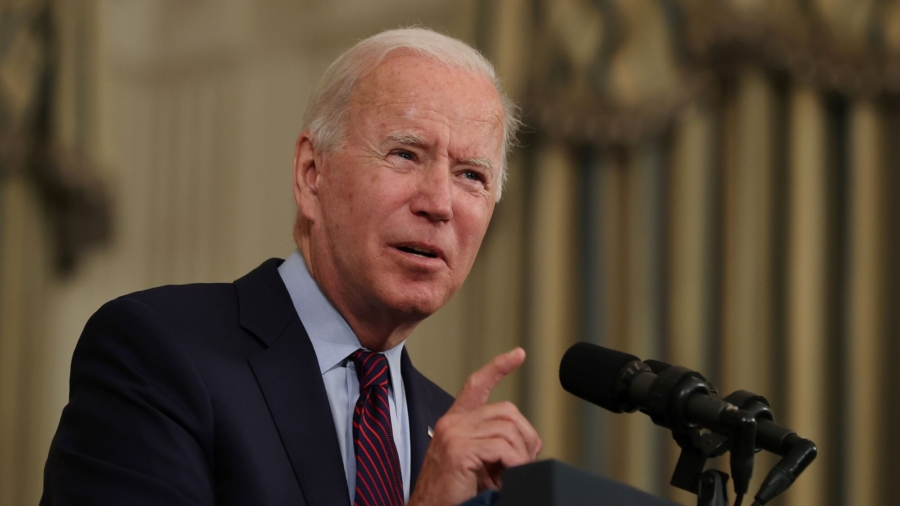President Joe Biden and his administration will not mint a proposed $1 trillion coin to resolve the U.S. debt ceiling crisis as it isn’t a “viable” option, White House press secretary Jen Psaki confirmed to reporters on Oct. 4.
“We obviously look at a range of options, and none of those options were viable, either because they wouldn’t be accepted by the Federal Reserve, by the guidance of our Treasury Secretary, or just by legal restrictions,” she said.
House Speaker Nancy Pelosi (D-Calif.) recently revealed to the press that Democrats are exploring a wide range of strategies to dealing with the borrowing limit in the future. One of these measures includes minting a $1 trillion coin, noting that Rep. Jerry Nadler (D-N.Y.) had raised this proposal—both in 2013 and 2021. Rep. Rashida Tlaib (D-Mich.) also showed her support for the concept by recently writing on Twitter, “#MintTheCoin.”
Treasury Secretary Janet Yellen is against utilizing the loophole to tackle the debt crisis. Speaking in an interview with CNBC on Oct. 5, Yellen argued that minting a $1 trillion coin is “a gimmick,” adding that “I don’t think we should consider it seriously.” Yellen said it “compromises the independence of the Fed” and it would erode the world’s trust that the United States can pay its bills.
In 2013, the Obama administration deliberated endorsing a scheme to mint a $1 trillion coin, deposit it to the Federal Reserve, and then draw from the money to pay for the government’s obligations. While the White House didn’t go through with the plan after discussing it with attorneys, former President Barack Obama later disclosed he had seriously considered going ahead with this proposal.
The U.S. central bank and the Treasury Department disagreed that “the law can or should be used to facilitate the production of platinum coins to avoid an increase in the debt ceiling.”
A Brief History of the Platinum Coin
The concept first garnered momentum during the debt ceiling crisis in 2011, but it gained significant traction two years later when economist Paul Krugman approved the measure in an opinion piece.
“If we have a crisis over the debt ceiling, it will be only because the Treasury Department would rather see economic devastation than look silly for a couple of minutes,” he wrote in The New York Times.
Supporters assert that minting a $1 trillion coin avoids the possibility of a default and the political gamesmanship on Capitol Hill. Some economists aver that proceeding with this unorthodox policy would force officials to grapple with the nation’s immense debt and deficit problems. Proponents also contend that the Treasury would possess the legal authority to issue platinum coins, according to Section 31 U.S. Code Section 5112:
“The Secretary may mint and issue platinum bullion coins and proof platinum coins in accordance with such specifications, designs, varieties, quantities, denominations, and inscriptions as the Secretary, in the Secretary’s discretion, may prescribe from time to time.”
Opponents say this signals to investors that the U.S. economy is unstable. Critics further purport that this would create a precedent for future administrations to print platinum coins whenever the government needs to pay for past spending. Other economists advise that the $1 trillion coin would take money out of the private sector and shift it to the public sector where it could lead to malinvestment.
Both sides agree that inflation would be either minimal or nonexistent. Should the Treasury produce a $1 trillion coin and sell it to the Federal Reserve Board, the central bank would react by contracting the money supply by the same amount through bond sales.
For now, the Democratic leadership has yet to adopt minting trillion-dollar coins as an official party plank.
Will Congress Strike a Last-Minute Deal?
Biden cautioned on Oct. 4 that the federal government could breach the $28.4 trillion debt limit and default on its obligations. He urged Republicans to work with Democrats and vote to raise it. Washington will have until Oct. 18 to act.
“Not only are Republicans refusing to do their job, they’re threatening to use their power to prevent us from doing our job: Saving the economy from a catastrophic event,” Biden said at a White House news conference. “I think, quite frankly, it’s hypocritical, dangerous, and disgraceful. Just get out of the way.”
The president noted that he intends to speak with Senate Minority Leader Mitch McConnell (R-Ky.) soon.
In an open letter to Biden, McConnell stated that the Democrats could exploit a parliamentary trick, known as budget reconciliation, to increase the debt ceiling on their own.
“Since mid-July, Republicans have clearly stated that Democrats will need to raise the debt limit on their own. Bipartisanship is not a light switch that Speaker Pelosi and Leader Schumer may flip on to borrow money and flip off to spend it,” McConnell wrote. “For two and a half months, we have simply warned that since your party wishes to govern alone, it must handle the debt limit alone as well.”
The Democrat brass has rejected this recommendation. Senate Majority Leader Chuck Schumer (D-N.Y.) disregarded moving ahead with reconciliation, describing it as a “non-starter” because it would take too long and “it’s very, very risky.”
Yellen has repeatedly projected that the government would exhaust its federal borrowing capabilities later this month. If Congress fails to address the debt limit, the United States could face a recession, the former head of the Federal Reserve said on CNBC’s “Squawk Box.”
“It would be catastrophic to not pay the government’s bills,” Yellen said. “I fully expect [default] would cause a recession as well.”
Last month, Moody’s Analytics forecast that defaulting would cost approximately 6 million jobs, trigger a 4 percent decline in the gross domestic product, and erase $15 trillion in household wealth.
The Treasury didn’t immediately respond to a request for comment.
From The Epoch Times

